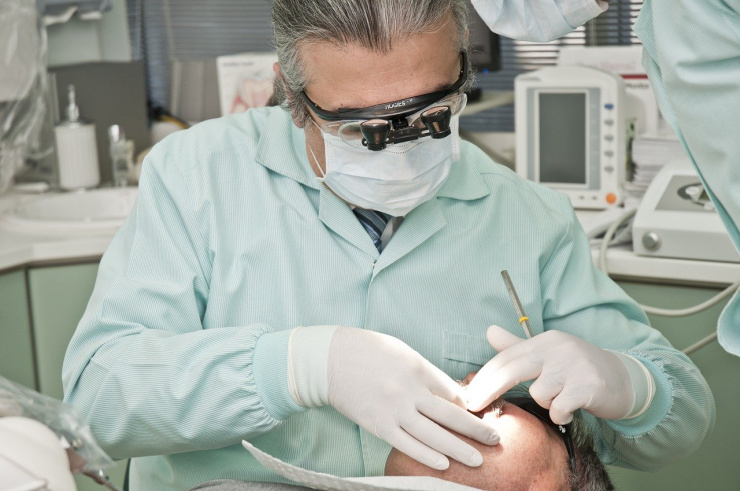There are many benefits to having dentures fitted at any age. At the same time, many people associate dentures with the elderly; many people of all ages wear dentures and have done so for years.
It is only natural to be wary of having your teeth removed and replaced with dentures, and it can cause a lot of worries and give you cause for concern. When your dentist starts the process of having custom dentures made for you, you must ensure a good fit and work closely with your dentist to allow them to get the mould correct for your mouth to avoid any damage or complications.
Benefits of having dentures can include;
- Better looking smile
- Easy to clean
- Improved confidence
- Ability to eat harder foods
The Denture Fitting Process
The process of having dentures requires taking an impression of your mouth where you will be wearing the dentures. This impression is used to create a mould from which your dentures will be created. The impression allows the technician to identify your mouth's correct space and shape for a better fit.
Next, the relationship with your upper and lower jaw will be registered to get a clear picture of your "bite".
You can try on your new denture in wax before your final dentures are made. At this point, your dentist can tweak and alter any things that aren't quite right or that you aren't quite satisfied with, ensuring that you have the best smile possible and that everything is exactly how you want it.
Your final appointment will be when you get your finished dentures, and you will be assessed for the correct fit and feel to ensure you are happy. At this point, you can ask any questions or get any last-minute adjustments, so you are happy before you leave.
From here, you can wear your new dentures as much or as little as you like. Remember, it may take a little time before you get used to your new dentures, so have patience and relax.
What do you need to do to prevent damage to your dentures?
Clean Hands Before Touching Dentures
The dental and denture clinic in Redcliffe, Australia "Enhanced Dental Studios" say that you should only handle your dentures with clean hands to avoid the possibility of introducing irritants or bacteria to your dentures and, by extension, your mouth.
Clean After Eating
Handle Carefully
Try not to place or remove dentures when in a rush and always take care when handling them to reduce the risk of damaging them when positioning and cleaning them. If you notice any damage, you can get a mobile denture repair to have them fixed easily without too much disruption to your day.
Clean Your Mouth After Removing Dentures
When you have removed your dentures, you may find bits of food that have become trapped between your teeth or under your fitting. Always clean your youth with a soft toothbrush, including your remaining teeth if you have any. Use gauze to clean the roof of your mouth and cheeks, and tongue too. Use this time to remove any denture adhesive if applicable.Brush Dentures Daily
Your dentures are your teeth for all intents and purposes and should be treated as such. Remove and clean your dentures daily. Soak your dentures, and then using a soft-bristled toothbrush or a denture specific toothbrush and a nonabrasive denture cleaner, remove any food or plaque build up along with any other deposits you may notice. Pay close attention to the grooves that fit against your mouth.
Soak Dentures Overnight
To enable your dentures to keep their shape, they need to stay moist. So when they aren't in your mouth, they need to be kept in water or a mild denture-soaking solution. Your dentist can advise you on the appropriate products to preserve the condition of your dentures, and you should always follow the manufacturer's instructions for storing and cleaning your dentures.Rinse Dentures Before Wearing
Get into the habit of rinsing them thoroughly before wearing them every day. This is especially important if you soak your dentures in a solution. It is worth knowing that denture solutions can contain chemicals that can make you ill and experience any pain, burning or vomiting. You think it is due to your denture solution, consult your doctor for medical advice.Regular Check-Ups
Your dentist will recommend you engage with regular checkups to assess the fit of your dentures, the condition and how you are coping with wearing them. At this point, you will be able to get them professionally cleaned and adjusted if required to reduce discomfort or slippage.What To Avoid When Wearing Dentures
If you are experiencing any issues with your dentures, you should consult your dentist. It is also important that you avoid the use of any harsh chemicals around your dentures too. this includes;- No abrasive materials - avoid using stiff-bristled brushes, strong cleansers and harsh toothpaste.
- Whitening toothpaste - whitening toothpaste often contains peroxide.
- Bleach - any dental products containing bleach or household cleaners containing bleach can weaken dentures and alter their colour. Do not soak metal dentures in solutions that contain chlorine, as it can corrode the metal.
- Hot water - hot water can damage and warp your dentures, ruining the fit.
- When you have had dentures fitted, you should treat them with patience and care
- to allow you to prolong the life of your dentures and avoid hefty repair bills. In any event, if your dentures are causing you pain or discomfort or the fitting has altered over time, always consult your dentist to allow them to check for any issues.
Once you're ready to replace your missing teeth, you can check out this dentist who does dentures, crowns, and quality dental implants in Chattanooga.
*Collaborative post








No comments